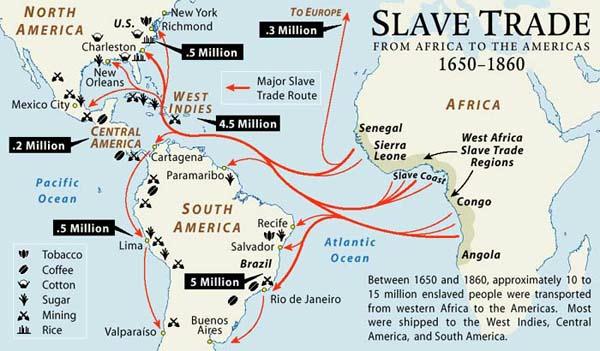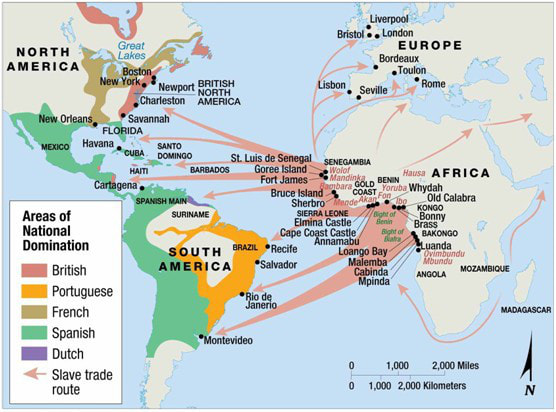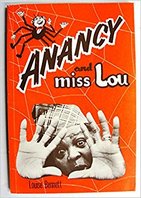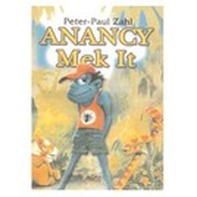In the 1490s, the first Africans brought to the Caribbean were kidnapped by the Spanish from the Canary Islands. At the time, islands were populated by the Native Tainos, Kalinagos (called the "Caribs" by Columbus), Ciboney, Lucayans, Igneris, & more! Natives fought against the taking of their lands. Still, sadly many did not stand a chance against European diseases and were also enslaved for free labor!
Slavery in the Caribbean, started with Christopher Columbus of Spain enslaving the natives of Hispaniola. He even brought hundreds back with him to Spain as slaves (majority dying on ship) and simply to show as his "discoveries".
During the 1600s and 1700s, the Spanish, British, French, and the Dutch fought over 'ownership' of the Caribbean islands. For example, within a single year the 'ownership' of an island would go back and forth between European nations. In 1625, the British invaded the Caribbean and started sugar plantations in Barbados, followed by taking several Caribbean islands from the Spanish.
During the time of sugar plantations, there were numerous slave rebellions. From armed rebellions, refusal to work, sabotage of crops and animals, all the way to self-mutilation and suicide! These enslaved Africans refused to be tortured! The largest slave rebellion resulted in the Haitian Revolution (1791-1804) on the French West Indian colony of Saint Dominigue (former name of Haiti) on the island of Hispaniola. Haiti's revolution even affected the eastern side of Hispaniola.
Thus in 1793, the Spanish abolished slavery in the Dominican Republic. In 1804, the French granted their enslaved Africans freedom and Haiti became the first independent Black nation of the Americas!
Years following, the British West Indies were granted freedom on August 1, 1834. Then, in 1863 the Dutch abolished slavery in Suriname and the Dutch Antilles of the Caribbean. Later, in 1873 Spain abolished slavery in Puerto Rico and later Cuba in 1886.
Still, all of these initial grants were not effective immediately. It took months to years for it to take full effect on plantations.
The slaves did not know they were free!!!
Interesting Facts:
It is estimated that there were about 50 million Natives in the Caribbean and by the end of slavery there were about 8 million!
It is also estimated that £4 million (pounds) by free physical labor came into Britain from their Caribbean sugar plantations!
With a large Caribbean population of African descent, many aspects of African culture have survived until this day.
A strong-willed people, proud of their culture, doing their best to preserve as much as they can!
Below are Examples of African influences on the Caribbean Culture (alphabetically sorted).
Slavery in the Caribbean, started with Christopher Columbus of Spain enslaving the natives of Hispaniola. He even brought hundreds back with him to Spain as slaves (majority dying on ship) and simply to show as his "discoveries".
During the 1600s and 1700s, the Spanish, British, French, and the Dutch fought over 'ownership' of the Caribbean islands. For example, within a single year the 'ownership' of an island would go back and forth between European nations. In 1625, the British invaded the Caribbean and started sugar plantations in Barbados, followed by taking several Caribbean islands from the Spanish.
During the time of sugar plantations, there were numerous slave rebellions. From armed rebellions, refusal to work, sabotage of crops and animals, all the way to self-mutilation and suicide! These enslaved Africans refused to be tortured! The largest slave rebellion resulted in the Haitian Revolution (1791-1804) on the French West Indian colony of Saint Dominigue (former name of Haiti) on the island of Hispaniola. Haiti's revolution even affected the eastern side of Hispaniola.
Thus in 1793, the Spanish abolished slavery in the Dominican Republic. In 1804, the French granted their enslaved Africans freedom and Haiti became the first independent Black nation of the Americas!
Years following, the British West Indies were granted freedom on August 1, 1834. Then, in 1863 the Dutch abolished slavery in Suriname and the Dutch Antilles of the Caribbean. Later, in 1873 Spain abolished slavery in Puerto Rico and later Cuba in 1886.
Still, all of these initial grants were not effective immediately. It took months to years for it to take full effect on plantations.
The slaves did not know they were free!!!
Interesting Facts:
It is estimated that there were about 50 million Natives in the Caribbean and by the end of slavery there were about 8 million!
It is also estimated that £4 million (pounds) by free physical labor came into Britain from their Caribbean sugar plantations!
With a large Caribbean population of African descent, many aspects of African culture have survived until this day.
A strong-willed people, proud of their culture, doing their best to preserve as much as they can!
Below are Examples of African influences on the Caribbean Culture (alphabetically sorted).
Anancy
Clothing/Prints/Colors
Examples: Head pieces and the "red, green, and gold" worn by Rastafarians & the prints worn/used in some festival costumes.
Watch this Video to Learn about Rastafarian Culture!
Watch this Video to Learn about Rastafarian Culture!
Food
It is disputable by some, which foods were brought to the Caribbean and which foods were there before slavery. Still, many West Indian foods and cooking styles have an African influence. For example, the popular root plants of yam, dasheen (taro), and cassava. Even further, callaloo (cassava leaf) is a popular leafy vegetable for many West Indians just like it is for many across West Africa (such as Liberia, Ghana, & Nigeria). After given the scraps from their masters, the African slaves used their cultural cooking styles to best recreate their African dishes or make new Caribbean dishes.
Other possible foods brought from Africa: ackee, okra, bananas, & plantains
Other possible foods brought from Africa: ackee, okra, bananas, & plantains
Jonkonno/Junkanno
Jonkunno (various spellings) is a yearly masquerade festival celebrated after December 25, Christmas Day and/or New Year's. Historically, these were the days when slaves had off. It was a time to rejoice and rejuvenate African customs. Various African cultures blended.
Disputable Origins
Some say it has Akan (Ghanaian/Ivorian ethnic group) origins and others say it has Igbo (Nigerian ethnic group) origins.
Some say it is in celebration of "John Kenu/John Conny" (unknown spelling of name), an Akan merchant and army leader from the late 1600s-early 1700s.
Furthermore, some say it is directly related to the Fancy Dress Festival (Jan 1) of the Winneba people of Ghana because similar to Jonkunno, it began with dressing in costumes in imitation of the local Europeans of their town, such as slave masters. This is similar to the various characters of Jonkonno in Jamaica, such as the "devil", for this character is believed to be a parody of the slave master. Today the Fancy Dress Festival is a masquerade competition.
Masquerade Characters: Costumes can differ depending on the location. Below are a list of characters used across locations.
King, Queen, Cow Head, Horse Head, Jack in the Green, Pitchy Patchy, Wild Indian, Belly Woman (said to represent the black woman that the slave master got pregnant), Devil, Police Man, Bride, House Head, Actor Boy, Dancing Ladies, and/or Warriors. Some use real animal parts for the Horse & Cow.
Below are some examples of Jonkunnu Celebrations found in the African Diaspora...
Disputable Origins
Some say it has Akan (Ghanaian/Ivorian ethnic group) origins and others say it has Igbo (Nigerian ethnic group) origins.
Some say it is in celebration of "John Kenu/John Conny" (unknown spelling of name), an Akan merchant and army leader from the late 1600s-early 1700s.
Furthermore, some say it is directly related to the Fancy Dress Festival (Jan 1) of the Winneba people of Ghana because similar to Jonkunno, it began with dressing in costumes in imitation of the local Europeans of their town, such as slave masters. This is similar to the various characters of Jonkonno in Jamaica, such as the "devil", for this character is believed to be a parody of the slave master. Today the Fancy Dress Festival is a masquerade competition.
Masquerade Characters: Costumes can differ depending on the location. Below are a list of characters used across locations.
King, Queen, Cow Head, Horse Head, Jack in the Green, Pitchy Patchy, Wild Indian, Belly Woman (said to represent the black woman that the slave master got pregnant), Devil, Police Man, Bride, House Head, Actor Boy, Dancing Ladies, and/or Warriors. Some use real animal parts for the Horse & Cow.
Below are some examples of Jonkunnu Celebrations found in the African Diaspora...
|
The Bahamas
In The Bahamas, Jonkannu is greatly celebrated with street parades, floats, bands, competitions, and more! They are two parades: one on December 26 and another on January 1.
|
Jamaica
In Jamaica, Jonkonno was at its peak during the 18th and 19th centuries. Over the years, celebrations have become smaller and have occurred less. Still today, some locals keep it alive!
|
|
Belize
In Belize, Jankunu or Habinahan Wanaragua is celebrated yearly with music and dance competitions. It was started by the former British slaves of Belize, before Belize became a Spanish colony.
|
North Carolina, United States
|
Kumina
|
Kumina (koo-mih-nah) is an African Jamaican religion filled with drums/music, dance, and ceremonies. Ceremonies are kept for holidays, weddings, anniversaries, deaths/funerals, to drive out evil spirits from those possessed or for those who seek help or guidance (such as illness or daily issues). A table is prepared for the spirits and a goat is always sacrificed at these ceremonies. Songs are sung in a mixture of a Congolese language and Jamaican Creole. It was brought to Jamaica from the BaKongo people of present-day Congo, approximately in the 1830s Post-Emancipation Era. Many came as indentured laborers. It is centered in St. Thomas, Jamaica.
|
Congo
|
|
|
|
|
|
|
Music
The music of the Caribbean/West Indies is a beautiful blend of African, European, Asian, and Native Caribbean beats, rhythms, and movement. From goat skinned drums to horns and other handmade instruments, the sounds of Africa are still alive!
There is such a wide selection of music found across these cultures, both sharing genres and having their own.
From rake-n-scrape in The Bahamas, to rumba in Cuba, to cariso in St. Croix, to bachata in the Dominican Republic, to bouyon in Dominica, to soca in Trinidad & Tobago, to tumba in Curaçao, to reggae in Jamaica, to kompa in Haiti, all the way to zouk in Martnique the list goes on and on!
There is such a wide selection of music found across these cultures, both sharing genres and having their own.
From rake-n-scrape in The Bahamas, to rumba in Cuba, to cariso in St. Croix, to bachata in the Dominican Republic, to bouyon in Dominica, to soca in Trinidad & Tobago, to tumba in Curaçao, to reggae in Jamaica, to kompa in Haiti, all the way to zouk in Martnique the list goes on and on!
Language Dialects/Creoles
The mixing of the Europeans, Natives, and West Africans birthed different Caribbean Dialects/Creoles. Overall, there are more similarities than differences among the English Creoles across the Caribbean. Accents and vocabulary can differ among them.
These creoles are more so spoken in informal settings.
These creoles are more so spoken in informal settings.
|
English-Based
Anguilla, Antigua & Barbuda, Barbados, Belize, British Virgin Islands, Cayman Islands, Dominica, Grenada, Guyana, Jamaica, St. Lucia, St. Kitts & Nevis, St. Vincent & the Grenadines, The Bahamas, Trinidad & Tobago, Turks & Caicos, & the U.S. Virgin Islands |
French-Based
Guadeloupe, Martinique, Saint Martin, & Saint Barthélemy (Saint Barts) (Eg. Kreyòl in Haiti) Portuguese-Based Papiamento - ABC Islands (Aruba, Bonaire, & Curaçao) |
Below are Examples of Similarities among West/Central African Languages and Caribbean Dialects/Creoles
Note: Word usage may very among islands. Some islands may share words, while others may have different.
Note: Word usage may very among islands. Some islands may share words, while others may have different.
Twi (Language Spoken in Ghana) -> Caribbean Dialect/Creole = English Definition
adope -> duppy = ghost
Mi -> Mi = I
Mi -> Mi = I
Nigerian Language -> Caribbean Dialect/Creole = English Definition
Igbo Example
unu-> unu = you (plural)
soso-> soso = only/just/is that all?
anya ukwu -> big eye (phrase/saying) = greedy
Yoruba Example
bosi -> boasie = arrogant, proud, show-off
Nigerian Pidgin Examples
pikin -> pickney = child,children
chook -> juk/jook = to poke
unu-> unu = you (plural)
soso-> soso = only/just/is that all?
anya ukwu -> big eye (phrase/saying) = greedy
Yoruba Example
bosi -> boasie = arrogant, proud, show-off
Nigerian Pidgin Examples
pikin -> pickney = child,children
chook -> juk/jook = to poke
African Language -> Caribbean Dialect/Creole = English Definition
Fula (Language Spoken in Senegambia) -> Caribbean Dialect/Creole = English Definition
juk-> juk/jook = to poke
Wolof (Language Spoken in Senegal) -> Caribbean Dialect/Creole = English Definition
nyam-> nyam = eat
Kongo (Language spoken in Congo & Angola) -> Caribbean Dialect/Creole = English Definition
zumbi-> jumbie = ghost
Disputable African Origin (Came to the Caribbean from the Akan and/or Igbo) -> Caribbean Dialect/Creole = English Definition
obeah -> obeah = witchcraft
juk-> juk/jook = to poke
Wolof (Language Spoken in Senegal) -> Caribbean Dialect/Creole = English Definition
nyam-> nyam = eat
Kongo (Language spoken in Congo & Angola) -> Caribbean Dialect/Creole = English Definition
zumbi-> jumbie = ghost
Disputable African Origin (Came to the Caribbean from the Akan and/or Igbo) -> Caribbean Dialect/Creole = English Definition
obeah -> obeah = witchcraft
Resources: Abolition Project, Black Past, About Jamaica, Lowcountry Digital History Initiative, Commemorative Landscapes Essays, Belize, Ghana Museums, African Studies Centre, Building Africa's Future, Youtube, Narratives by West Indians, and Speakers of African Languages
Click Here to Read: "The Arrival of the Africans" By the Jamaica Gleaner
Click Here to Read: "Lecture: African Heritage in the Caribbean" By Chike Pilgrim of the Trinidad & Tobago News Blog
Click Here to Read: "The Arrival of the Africans" By the Jamaica Gleaner
Click Here to Read: "Lecture: African Heritage in the Caribbean" By Chike Pilgrim of the Trinidad & Tobago News Blog
Page Written & Compiled By Chong Laoshi #thechonglaoshi







